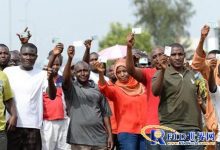
Nigeria’s 2015 general election uses RFID technology
[ad_1]
On the 28th local time, the Nigerian presidential and National Assembly elections officially began. The current president, the ruling People’s Democratic Party’s presidential candidate Jonathan and the largest opposition party, the General Progressive Congress party’s presidential candidate Buhari are running for the presidency.

On election day, about 70 million registered voters across the country cast their ballots at 150,000 polling stations. Our reporters personally witnessed the election at three polling stations in Banex in Usay District, Abuja, Mississippi in Maitama District, and the African Union Office. the election process.
The electoral process consists of voter identification and voting. The authentication process is as follows: the staff scans the voter card with a card reader and performs fingerprint identification, checks the voter’s text information, and marks the voter’s nail with a colored pen. The certification of the above three polling stations was completed by noon. Around 2:00 p.m., each polling place entered the voting session.
“This election has adopted an advancedRFIDRadio frequency identification technology, the voter card chip contains personal photo and fingerprint information, and the card reader is connected to the remote server, which can effectively identify the authenticity of the voter card and reduce the risk of artificial election manipulation. This is the first time in Nepal’s electoral history. ‘ said Mustafa, a Mississippi poll worker, proudly.
In addition, individual voters who have not passed fingerprint identification are allowed to vote after filling in the “Authentication Incident Form”. This emergency measure makes up for the shortcoming of the slower fingerprint identification speed of the card reader. The reporter saw at each polling place that the vast majority of staff can operate the card reader proficiently after a short period of adaptation, and the authentication process for each voter takes about 2 minutes on average.
On the 29th, the relevant person in charge of the Nigerian Independent National Election Commission said in an interview with reporters at the Nigerian National Convention Center that there were 57 polling stations in the capital region, of which 2 were postponed to the 29th for some reason, and the remaining polling stations were progressing smoothly. Announced on the same day.
[ad_2]



